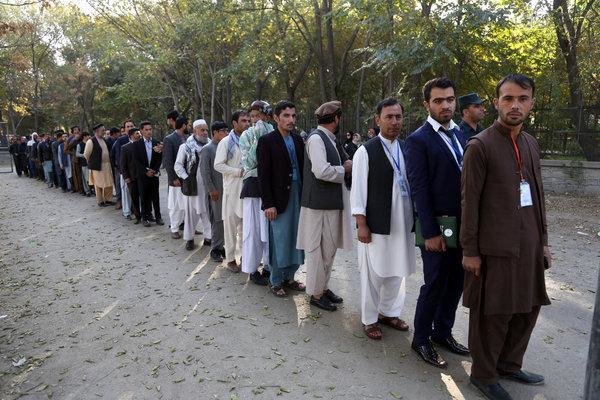Despite fears of violence, Afghan parliamentary polls sees high turnout

TEHRAN- Despite the threats of terrorist groups to disrupt the election, Afghans came out in large numbers on Saturday to cast their votes in the historic parliamentary election.
People lined up for hours to cast their vote in different provinces in what reports claimed was a chaotic start to the elections held after a series of attacks across the country in recent weeks.
Election workers struggled with a new biometric system as they took lot of time to locate names on voter lists. In some polling stations in Kabul, voting started considerably late due to chaos and mayhem.
The new biometric machines are meant to curtail fraud and irregularities. Independent Election Commission chairman, Abdul Badih Sayat, warned ahead of polling that the system might experience glitches and asked for voters' patience.
Meanwhile, the Defense Ministry said it had increased its deployment of security forces to 70,000 from the original 50,000 to protect the country's 21,000 polling stations.
Elections in the two provinces of Kandahar and Ghazni have been delayed as well as in 11 of the 400 districts following Thursday’s deadly attack in Kandahar which killed top political and security leadership.
Afghan President Ashraf Ghani marked his ballot at the start of voting. In a televised speech afterward, he congratulated Afghans on another election and praised the security forces, particularly the air force, for getting ballots to Afghanistan's remotest corners.
The list of candidates, which has been trimmed to 2,565 after the disqualification of 35, are competing for 249 seats in the lower house of the Afghan parliament. Many former parliamentarians are running again, along with young and educated men and women – journalists, activists, entrepreneurs.
Past elections resulted in deeply contentious results – in 2009, 2010, and 2014 – with candidates accusing each other and the government of that time of manipulation and vote rigging. In 2014 presidential elections, Ashraf Ghani and Dr. Abdullah Abdullah publicly argued over election results, before the compromise formula was worked out to form a coalition government.
The election had been repeatedly deferred due to the fragile security environment and national unity government’s lack of preparedness.
In the run up to elections, Taliban and ISIS have carried out a series of terrorist attacks. In the latest attack on Thursday in southern province of Kandahar, the entire provincial leadership was wiped out, including a powerful police chief.
According to the recent SIGAR report, almost 56.3 percent of Afghanistan’s districts are currently under government control and at least 30 percent of districts are contested, which shows the resurgence of insurgents and helplessness of the Afghan government.
Before November's ministerial meeting on Afghanistan in Geneva, which the United Nations has termed “crucial moment” for the Afghan government, successfully parliamentary elections would be ideal.
